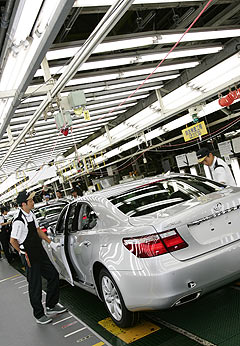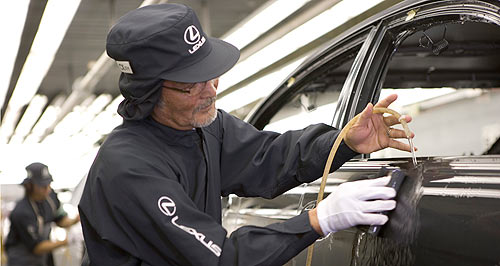Make / Model Search
News - General NewsJapanese motor industry suspends productionTools down: The Mazda3 assembly plant in Hiroshima is one of numerous Japanese car factories to be shut until the effects of the Japanese earthquake and tsunami become clearer. Seven Japanese carmakers shut plants to assess quake damage, parts supply14 Mar 2011 MUCH of Japan’s motor industry remains shut as car companies assess the impact of Friday’s huge earthquake and tsunami on its supply chain and ports. Little immediate damage was reported by the big Japanese manufacturers at their own plants across Japan, but the main concern now centres on component suppliers and service industries that are vital to their operations. Seven of the biggest brands – Toyota, Nissan, Honda, Mazda, Mitsubishi, Subaru and Suzuki – all announced that their factories would be shut while they assessed the impact. However, Australian subsidiaries for the various Japanese companies say they expect little effect on local car supplies unless the suspension of production drags on. The massive Japanese motor industry famously runs on a just-in-time delivery system, which only works when all the required parts are delivered without interruption. Japan is the largest source of motor vehicles for Australia, delivering 356,000 cars and trucks to Australian customers in 2010 – more than the next two suppliers, South Korea and Thailand, combined. Most of the Japanese motor industry is clustered south of the danger zone, although Toyota has a new plant in Miyagi Prefecture – one of the worst hit areas.  Left: Lexus production in Japan. Left: Lexus production in Japan.The factory was building Yaris light cars, but Toyota Australia spokesman Mike Breen said supplies of that model for Australia come from Toyota City, near Nagoya, south of Tokyo. The top-selling Corolla small car also comes from Toyota City. Toyota has closed 12 plants until at least Wednesday while it surveys plant damage and makes sure all of its employees are safe. So far, only one Japanese car industry worker is known to have been killed at work, a man who was felled by a collapsing wall in the cafeteria at Honda’s Tochigi research and development facility, about 100km north of Tokyo. About 30 other industry workers have been injured by falling ceilings and other debris. Fires were reported at two Nissan facilities in the same area, but both were extinguished without serious damage. Nissan said that, while its Yokohama City global head office and technical centre would remain open today (Monday), production at all five of its main assembly plants would be suspended while it assessed the situation. The company said it did not know when production would resume. “We are continuing to assess the damage to our facilities and equipment, as well as discussing parts delivery with our suppliers,” the company said in a statement. Nissan’s new Yokohama headquarters provided makeshift shelter for 150 stranded people on Friday night after public transport shut down. They were given blankets and water to get them through the night. About 2300 Nissan vehicles stored on two sites in the path of the tsunami were damaged. Although Mazda’s manufacturing hub at Hiroshima is well south of the epicentre, interruption to parts supplies has forced the company to suspend operations. “While regular production continues today, nightshift production tonight and production tomorrow has been cancelled,” the company said, adding that a decision on the resumption of production would be made on Tuesday afternoon. Mitsubishi Motors also appears to a have escaped major damage, and all staff were reported safe. President and CEO of Mitsubishi Motors Australia, Masahiko Takahashi, issued a statement to Australian dealers saying everyone at the company had been distressed by the disaster. He said that, while Mitsubishi’s own facilities appeared unharmed, “the plight of Mitsubishi Motors dealerships and suppliers across the country, and the situation with Japanese shipping companies and ports is, unfortunately, yet to be confirmed”. Fuji Heavy Industries – maker of Subaru vehicles – said its factory at Gunma, north-west of Tokyo, would be closed for inspections today. While Honda has closed most of its plants in Japan, this is expected to have little effect on Australia, where the local subsidiary imports most of its range from Thailand. However, the ripples caused by parts shortages from shuttered supply factories might extend to other such plants if the Japanese factory closures are extended. Among the big parts-makers known to have suspended production is the Toyota-owned Denso – Japan’s biggest automotive component supplier. The state of Japanese ports is a major concern for car companies, but most cars destined for Australia are shipped from ports south of Tokyo such as Yokohama, away from the tsunami-smashed coast. Mazda has its own dockside roll-on shipping facility in Hiroshima while Toyota mostly uses huge facilities near Nagoya.  |
Click to shareGeneral News articlesResearch General News Motor industry news |









Facebook Twitter Instagram